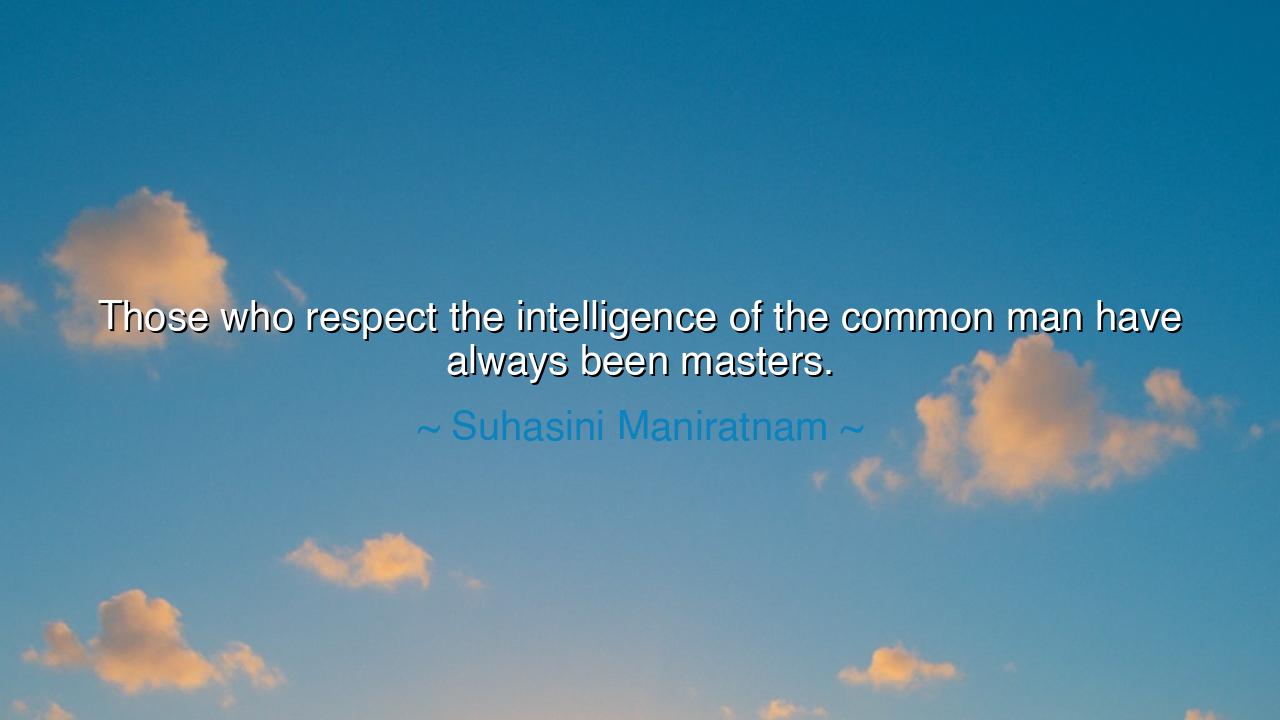
Those who respect the intelligence of the common man have always






Hear now the wisdom of Suhasini Maniratnam, who declared with piercing clarity: “Those who respect the intelligence of the common man have always been masters.” These words ring not as flattery, but as eternal counsel. For in every age, the great mistake of rulers, philosophers, and leaders has been to underestimate the strength of the people, to think them blind, to treat them as pawns in a game of power. Yet history whispers again and again: the true master is not the one who scorns the multitude, but the one who honors their wisdom, their toil, and their dignity.
The origin of this truth lies in the ancient bond between leader and follower, between master and people. The common man, though not cloaked in titles or power, bears within him the wisdom of life itself—wisdom of soil and labor, of hunger and survival, of family and faith. To respect this intelligence is to walk in harmony with the very heartbeat of humanity. Those who recognize this grow strong, for their leadership is built not on domination, but on trust.
History bears witness. Consider Mahatma Gandhi, who looked upon the farmers, the weavers, the poor, and the illiterate not as expendable masses, but as the very soul of India. He spoke in their language, walked barefoot on their roads, and trusted in their judgment. Because he respected their intelligence, he awakened a movement that no empire could crush. Gandhi was a master, not by crown or sword, but by reverence for the people.
Likewise, in the ancient world, Pericles of Athens rose not by force but by his faith in the common citizens. He believed that every man, regardless of wealth, could contribute to the destiny of the city. By granting them voice and by respecting their reason, he built a democracy that gave birth to philosophy, art, and science. Athens flourished because its leader honored the wisdom of its citizens, not because he scorned it.
Yet the opposite is also true. Those who mocked the people, who treated them as ignorant and unworthy, saw their empires collapse. The arrogance of kings who raised themselves above their subjects only bred rebellion. The fall of tyrants, from Nero to the despots of modern times, teaches us this: to despise the intelligence of the common man is to build a throne upon sand. For the people remember, they endure, and in the end, their strength overturns all who dishonor them.
The emotional power of Maniratnam’s words is this: they remind us that greatness lies not in isolation above the crowd, but in fellowship with it. The true leader listens before commanding, honors before ruling, and trusts before demanding loyalty. To respect the people is to unlock their deepest strength, for men and women give their best not when they are coerced, but when they are trusted.
The lesson for us is plain: whether in governance, in work, or in family, we must learn to respect the intelligence of others, especially those overlooked by pride. Do not dismiss the voice of the humble worker, the servant, the student, the child. Listen to them, for in their simplicity may lie truths deeper than the schemes of the clever. By respecting others, you strengthen your own soul, and by honoring their wisdom, you gain mastery over life’s challenges.
Therefore, let your actions reflect this teaching. In your speech, show reverence; in your work, seek the counsel of all; in your life, never mock the lowly, but recognize the spark of intelligence in every human being. For as Maniratnam has spoken, “Those who respect the intelligence of the common man have always been masters.” To live by this is to walk the path of true greatness, where respect births trust, and trust gives rise to power that no force on earth can overthrow.






AAdministratorAdministrator
Welcome, honored guests. Please leave a comment, we will respond soon